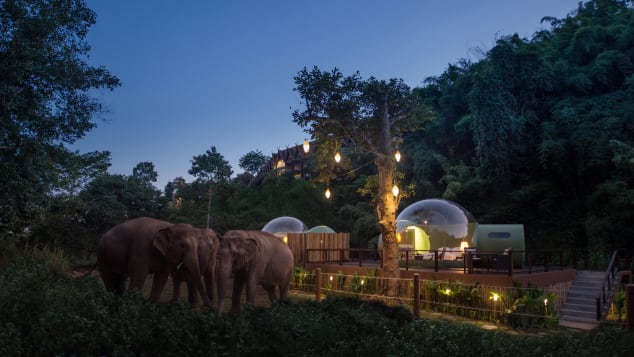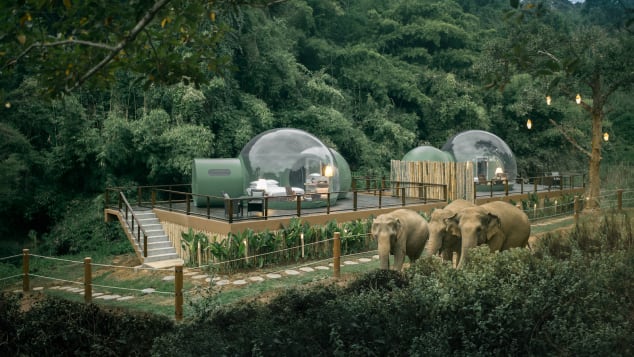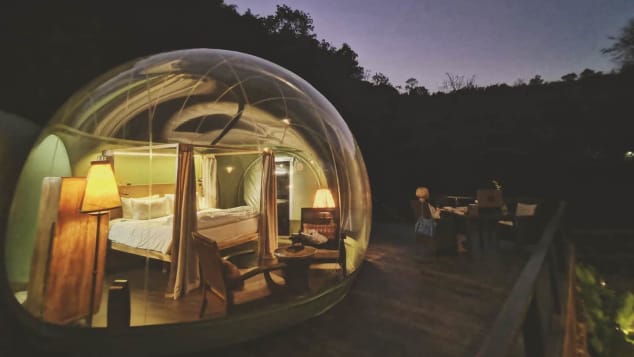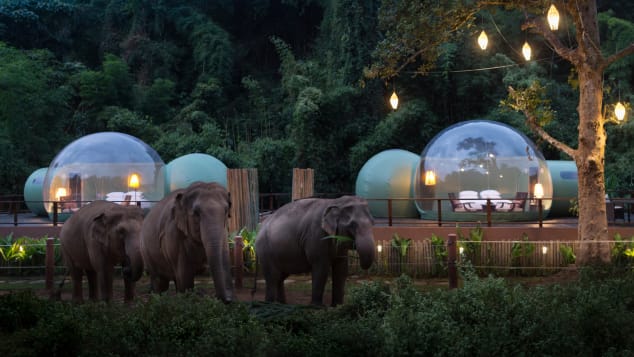The two transparent domes sit next to a large enclosure inhabited by three rescued elephants, which are cared for by the resort's
Guests can sit back and watch as these female elephants play with the strategically placed "toys" that hang from large trees, their powerful trunks occasionally ripping off huge chunks of bark and branches, sending loud cracks through the evening air.
But really, they mainly just want to eat.
Thankfully, a hefty supply of sugar cane is placed within eyesight of the bubbles, meaning the elephants are almost always just a few steps away.
The bubbles are booked as an "experience" in addition to your reserved resort room, for 17,700 baht (US$563) per night per couple. This means you can just pack an overnight bag and leave the rest of your belongings in your suite.
Guests are picked up from the lobby just before sunset, then driven down a dirt road in an open-air jeep before taking a short walk through the resort's rice paddy to get to the bubbles.
Shortly after arrival, staff deliver an evening picnic basket, filled with pre-selected sandwiches and other cold dishes, allowing you to eat alongside the animals. There's a strict "no hands" policy when it comes to the elephants though -- bubble guests are not allowed to touch or feed them.
So how comfortable are the bubbles?
Each air-conditioned, pressurized 22-square-meter space is a mini slice of luxury, furnished with a comfortable king-sized bed. There's a small washroom with a toilet and shower, along with a couple of chairs and a small table near the bed. No TVs here -- the elephants are the star of this show.
Sensitive sleepers will find It particularly surreal. As night passed during a recent visit, the moon made its way over the bubble, offering various levels of illumination. (Eye masks are provided as it can be surprisingly bright.)
Given these ladies don't nod off much -- elephants in captivity sleep only 4-6 hours a day -- you'll hear all sorts of delightful sounds throughout the night and might find yourself crawling out of bed for a late-night peek.
The bed features wrap-around curtains, offering privacy for those who worry they won't wake up before the caretakers arrive with the elephants' breakfast.
Trial and error
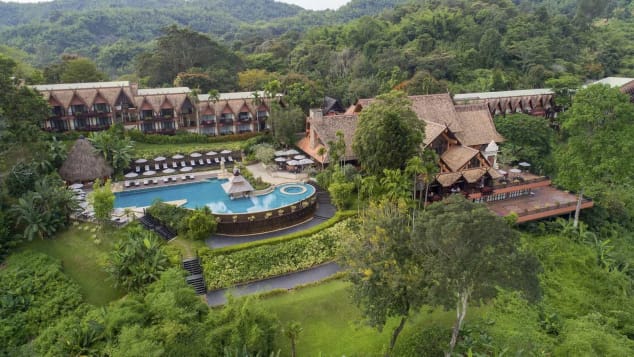
The idea for the "Jungle Bubbles" came from General Manager Gaudéric Harang, who has been with the resort for about a year and a half. He says they were born of a desire to push the boundaries and offer a unique guest experience in line with modern luxury expectations.
In addition to safety concerns -- "making sure our bubbles would be elephant proof" -- he says they had to meet very high standards.
"As a top notch resort, we had to ensure the experience would be very luxurious and to the level of what is expected by our guests," he explains.
Once the bubbles were set up, Harang was the first to trial them.
"Being in the north of Thailand, we are lucky to have a climate that's more varied than in the rest of the country," he says. "Though short, we go through a winter season that is very cold. When the bubbles were finally ready [in December] it was 6 degrees Celsius in the morning and...well I froze!
"There was no heater. Also, being located in the jungle there is a lot of humidity so the bubbles were very wet at night due to all the condensation. So, I woke up at 3 a.m., soaked and cold."
As a result, the bubbles are now equipped with an air conditioner, space heater and dehumidifier to ensure a comfortable climate for all seasons.
"When I finally saw the bubbles in place I was so happy it all worked out, but I think I was only really impressed when I slept in it the second time [after the climate issues were sorted]," he recalls, telling CNN Travel it was truly a "wow" moment.
"When you finally live it, you see it's really a fantastic experience. We couldn't have planned it better."
The right elephants for the job
Picking the right elephants for the Jungle Bubbles experience was another logistical issue that needed to be sorted, says John Roberts, Anantara's Director of Elephants.
Besides size considerations -- how many elephants could comfortably live on the available plot of land? -- they also had to decide which of the camp's elephants would enjoy being together in the enclosure. Turns out, even elephants can get into tiffs with their friends -- just like humans but with an additional 3.5 tonnes of weight to throw around.
The three elephants in the Jungle Bubbles enclosure all arrived at the resort between 2006-2010, so Roberts and his team already had ample time to get familiar with their temperaments.
"We watched them for a long time," says Roberts. "We know that they like being together -- actually [two of them] are pretty much inseparable at this stage and if you try and separate them they get pretty stressed."
Offering a better life to captive elephants
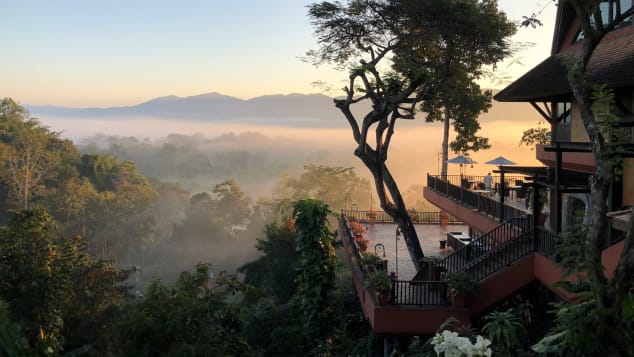
Anantara's nonprofit Golden Triangle Asian Elephant Foundation (GTAEF), founded in 2006 and overseen by Roberts, cares for about two dozen elephants.
Most of the animals have led hard lives -- some spent their days walking the streets of Bangkok with their owners, making money begging from tourists. Others came from tourist trekking camps.
The way the program works is the foundation invites mahouts (elephant trainers/owners) and their families to move to Chiang Rai with their elephants and live in the foundation's camp.
The foundation offers them a wage, which includes the cost of care for their elephants. This amounts to about $18,000 per elephant per year.
Roberts acknowledges that in a perfect world all elephants would be roaming free in the wild but the situation is incredibly complex.
"Unfortunately, you can't release elephants in Thailand," he says, rattling off a long list of complications including fears of disease transmission, potential conflict in a fragile wild herd and an inability for domesticated elephants to fend for themselves given they've spent most if not all of their lives in captivity. And then there are Thailand's laws, which would also need to be changed.
Thailand's domesticated elephants are all registered under the Draft Animals Act, so "if you put a captive elephant in a national park you're officially illegally grazing your livestock and that's the law as it is," says Roberts.
As an alternative, the GTAEF aims to improve the welfare of captive elephants through various programs not just at its resort but throughout the region -- including mahout training -- while also taking part in conservation and wild elephant programs.
At the resort's elephant camp, this means figuring out the elephants' personalities though science and observation and matching them with activities that suit them -- an essential part of their well-being. For instance, elephants that are comfortable around strangers take part in the peaceful "Walking with Giants" experience.
"In the wild their entire lives are based around walking long distances and finding food," says Roberts. "They have big brains, you have to keep them stimulated doing different things. You could just put them out there in a field, but they'll stand in one spot all day."
Inside the resort
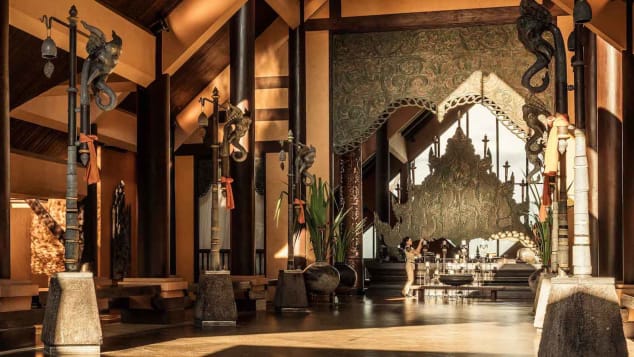
The Anantara Golden Triangle Elephant Camp & Resort is located on the edge of Thailand's northern border in the town of Chiang Saen, just over an hour from Chiang Rai city.
There are two restaurants -- Thai eatery Sala Mae Nam and Baan Dhalia, which serves Italian -- while the poolside Elephant Bar and Opium Terrace is an essential stop for pre-dinner drinks.
The spacious rooms, featuring traditional Thai decor, come with long balconies that overlook both Laos and Myanmar. Coffee in hand, it's the perfect place to begin the day, watching the sun rise through the mist.
Resort activities include day trips to Laos and Myanmar, river boat journeys, spa treatments and in-house classes like cooking and Muay Thai. But our favorite has to be the new Royal Enfield Classic 500 sidecar experience, a fun ride through the nearby countryside and villages guided by hotel staff.
Even getting to the resort is an adventure. After a flight to Chiang Rai followed by an hour-long drive, guests can opt for a 15-minute ride up the Mekong River in a small Thai speed boat to the resort's private dock, passing the shores of Laos and Myanmar along the way.
CNN.com
